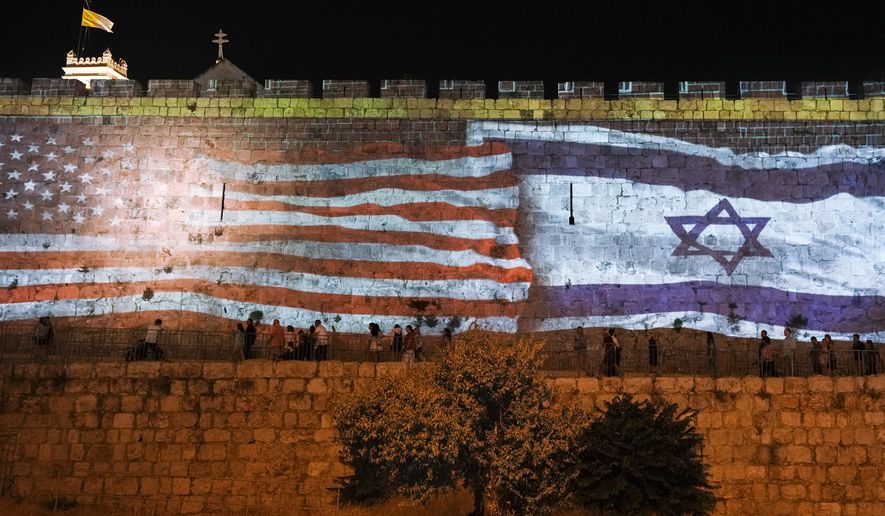The Presbyterian Church (USA) on Friday declared Israel’s treatment of Palestinians in the West Bank and Gaza Strip meets “the international legal definition of apartheid.”
The church adopted a resolution — called an “overture” in denominational language — that calls on its 1.2 million members “to seek appropriate ways to bring an end to Israeli apartheid.”
Separately, delegates to the church’s 225th General Assembly voted to have the Presbyterian Mission Agency Board designate May 15 of each year as “Palestinian Nakba Remembrance Day” to show “solidarity with those suffering under [Israeli] occupation.” That move was approved as part of a larger “consent agenda” used for items less likely to spark floor debate.
Palestinians use the word “Nakba,” meaning disaster, catastrophe or cataclysm in Arabic, to mark the establishment of Israel in 1948.
The anti-Israel resolution was criticized by other Christian groups.
Commemorating the founding of Israel as a day for pro-Palestinian solidarity shows “a disconnect between the lip service paid to the idea that Israel should exist and the words on the pages of the documents that are being advanced by the Presbyterian Church (USA),” said Ari Morgenstern, senior director for policy and communications at Christians United for Israel, an evangelical Christian organization.
The Presbyterian Church’s apartheid resolution passed in a 266-116 vote. It was the culmination of nearly 20 years of debate and dissension in the ranks. A 2004 resolution called on the church to divest from multinational firms that did business in Israel, although that language was softened two years later to make divestment a “last resort.”
A group of members and clergy who opposed the latest action said the vote will feed the belief that America’s largest Presbyterian denomination is antisemitic.
“We cannot escape the reality that Jewish community, feeling more and more isolated in the U.S., will no longer view the PCUSA as a friend but instead an enemy riddled with advocates out to destroy Israel as a Jewish state,” said a statement from Presbyterians for Middle East Peace.
The statement said the denomination engaged in “slander” against Israel, adding, “the path to peace in Israel/Palestine will not be found on a path of anti-Israel rhetoric that offers nothing tangible to the Palestinian people.”
The Presbyterian Church held its combined virtual and physical General Assembly this week in Louisville, Kentucky. Discussion of the measure labeling Israel as an apartheid state was moderated on the floor with presenters speaking via video links.
The Rev. Peter Crouch, a denominational employee who served on the committee that put the measure forward, said the document “does not criticize the Jewish religion, or all who practice it,” a comment one Jewish leader quickly rejected.
Rabbi Abraham Cooper, associate dean and director of global social action for the Simon Wiesenthal Center in Los Angeles, said it was “absolute arrogance” for Mr. Crouch to make that claim. He said the Jewish prayer book known as the “Siddur” has dozens of references to Zion, or Israel “and the return of the Jewish people there.”
Mr. Cooper said the PCUSA leaders “have a political narrative that has no space for historic reality, like a 3500-year relationship between the people of Israel and their land.”
The rabbi said the resolution makes the “bomb-throwers and the missile-launchers” among the Palestinians come out stronger against “the moderates in the Palestinian camp.”
Claire Louise Schoppe, a ruling elder commissioner, was one of the few delegates to speak against the measure.
“There are so many numerous communities within our denomination that have been faithfully seeking to become part of an intentional interfaith relationship with our Jewish neighbors,” she said. “And my personal fear is that this recommendation if approved as written may be construed as turning our back on those important relationships.”
The Friday vote is not the first time the Presbyterian Church found itself in controversy over statements about Israel. In January, the Rev. J. Herbert Nelson II, who heads the denomination as its stated clerk, called Israel‘s treatment of Palestinians an “immoral enslavement,” sparking pushback from several quarters. He made his comments days after a gunman took hostages at a Texas synagogue before being shot and killed by police.
“While my reference to these injustices as ‘slavery’ may seem extreme to many and, of course, offensive to most Israelis,” Mr. Nelson said in a statement, “no one who is informed regarding the use of military power and racial bias to control the lives of Palestinian citizens can honestly avoid the truth of this situation.”
The Presbyterian Church (USA) was formed in 1983 by the merger of the chiefly southern U.S.-based Presbyterian Church in the United States and the United Presbyterian Church in the United States of America, which had congregations across the country.
Beginning with 3 million members, a series of schisms and departures have cut membership by nearly two-thirds, and the Presbyterians for Middle East Peace statement suggested the PCUSA might shrink to fewer than 1 million members by the time of the 2025 General Assembly, which is slated to meet in Salt Lake City, Utah.
• Mark A. Kellner can be reached at mkellner@washingtontimes.com.




Please read our comment policy before commenting.